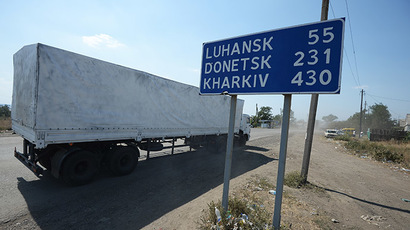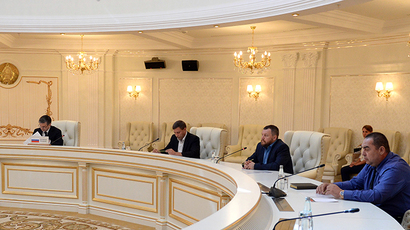3rd Russian humanitarian aid convoy arrives in Donetsk
The third convoy of Russian humanitarian aid for eastern Ukraine has arrived in the war-torn city of Donetsk. Earlier, Kiev and self-defense forces signed a memorandum aimed at effectively halting all fighting in eastern Ukraine after talks in Minsk.
Is the war over? Both sides in the Ukraine conflict signed a treaty banning military action
The convoy of around 200 vehicles is carrying some 2,000 tons of cereals, canned food, generators, medicine, warm clothes, and bottled water.
Russian authorities said they had offered to allow the Ukrainian border guards to check the vehicles on the border on several occasions, but the guards declined without citing any particular reason.
The trucks have started unloading the aid in two of the city’s storehouses.
“We need humanitarian aid badly as there is almost no food in the shops. People aren’t receiving their pensions. Children are hungry. It’s high time,” a local resident, Vitaly, told RT.
According to another resident, people didn’t sleep last night as they waited for humanitarian aid.
“People are suffering now. We don’t have any products. Thank you, Russia,” he added.
After unloading humanitarian aid the trucks returned to Russia. The first column has already crossed the Russian border.
On September 13, and on August 22 Russia delivered humanitarian aid to Lugansk in eastern Ukraine. All in all over 4,000 tons of aid has reached the crisis-stricken city.
On both occasions Kiev refused to clear the cargoes and accused Russia of invading Ukraine. Moscow on its part accused the Ukrainian authorities of deliberately stalling the relief missions.
The deputy head of Russia’s Emergency Service, Vladimir Stepanov, said on Wednesday that Russian authorities will continue delivering humanitarian help to cities in eastern Ukraine.
“In Russia [we] are continuing to collect humanitarian aid and form volunteers’ brigades,” he said.
Meanwhile, on Friday the International Committee of the Red Cross (ICRC) delivered 60 tons of food aid to Lugansk, supplementing supplies previously received from Russia.
“With winter coming up, ICRC is working with the local authorities in eastern Ukraine to meet the most pressing needs," said Michel Masson, head of the ICRC delegation in Ukraine.

The ICRC will also be distributing basic shelter materials in Lugansk, enabling rapid repairs to be made to roofs and windows of some 500 homes damaged in the hostilities.
"We remain in contact with the Ukrainian and Russian authorities on their humanitarian initiatives," said Laurent Corbaz, head of ICRC operations in Europe and Central Asia.
The organization added it is currently sending 40,000 family parcels to families in the conflict zones in eastern Ukraine. Each parcel contains 60 kilos of basic food items.
In the meantime, the situation in the city of Donetsk remains unstable despite the ceasefire deal reached by Kiev and rebel forces, said a statement from the Donetsk city council.
“Active shooting from large-caliber weapons is going in the northern part of Kievsky district as well as in the Petrovsky and Kirovsky [districts]. Local residents have told us about it,” said the statement.
On September 19, two explosions were heard near Donbass Arena stadium, the Shakhter Football Club said in a statement. Nobody was injured by the blasts, but the stadium staff was evacuated.
Earlier on Friday the warring factions signed a memorandum on securing a more stable ceasefire after talks in Minsk, Belarus.
“The first [point] is to stop the use of weapons by both sides; the second is to stop all military and militia units in their positions as of September 19. The third is to ban the use of all types of weapons and offensive action,” former Ukrainian president Leonid Kuchma, who represents Ukraine at the talks, told journalists.
The agreement outlines a buffer zone of 30km and bans all military aircraft from flying over the rebel-controlled part of eastern Ukrainian territory. An exception is being made for the surveillance drones used by the OSCE to monitor the situation, Kuchma said.
Minsk protocol: Ukraine to be decentralized, special status for Lugansk, Donetsk
The memorandum follows a more general ceasefire agreement signed on September 5, which outlined a peace roadmap for Ukraine.














